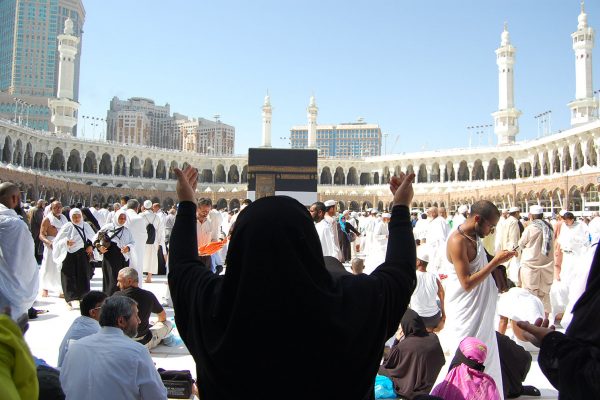The answer is partly that genuine inequalities have not been addressed in Islamic terms, though they could well have been.
The answer is partly that genuine inequalities have not been addressed in Islamic terms, though they could well have been.
The answer is partly that genuine inequalities have not been addressed in Islamic terms, though they could well have been.
Feminism and Islam is a hot topic. Some Muslim women are finding a platform to voice their exasperation with today’s Muslim community, claiming it be to patriarchal and in places misogynistic. In doing so, many of our sisters have synergised with a feminist discourse, using it to bolster and construe their critique. A counter-narrative has emerged from some Muslim men, which asserts that feminism is a corrupting force and we should be wary of it.
Thus, a debate has emerged on the yays and nays of feminism. Is it Islamic? Does it take someone closer or further away from Allah? Are current interpretations of Islam patriarchal?
As fascinating as these questions are, I propose that we step back and ask a different question; why are so many Muslim women able to relate to feminism?
Somebody who is critical of feminism may well answer by saying that Muslim women are being swayed by a Western narrative on women’s rights and are thus moving away from what is perceived to be an Islamic narrative. Perhaps there’s some truth to this. However, it is not the only explanation.
Another answer, one that is seldom considered, is that many Muslim women have been alienated by their own community. They have been denied many important rights (lack of access to mosques, centres of knowledge, scholars etc.), and crucially, they have not seen the current discourse (or lack thereof) in the Muslim community as sufficiently addressing this problem. There are plenty of statements floating around – ‘Muslim women are queens’, ‘Islam liberated women 1,400 years ago’, but given the above examples, the manner in which parts of the Muslim community treat women is contradictory to these statements.
It is this incongruity that has beautified feminism for Muslim women; it’s a narrative which calls out inequality, and grants companionship in a shared struggle. In other words, they have found in feminism what they were not able to find in the discourse of today’s Muslim community. This is why some Muslim women have taken so well to feminism.
This is quite a shame, because many of these inequalities have already been spoken about openly in Muslim communities centuries before feminism existed. For example, Ibn Hazm (d. 456 AH/1064), the great Andalusian jurist wrote a treatise of the lawfulness of women praying in the mosque. His opinion would put him at odds with many mosques today. Likewise, we know of a huge number of female hadith scholars – Shyakh Akram Nadwi has documented at least 9,000 female hadith scholars over Islamic history. So clearly Muslim societies have allowed, if not encouraged, women to access and even pursue knowledge.
One can find many such examples of discussions and debates over the course of the Islamic community. All of these have comfortably been discussed within an Islamic narrative. Today however, these issues are now seen as being debates instigated by feminism. If the Muslim community had done a more thorough job of bringing to light these previous discussions, would as many Muslim women associate with feminism? Probably not, and yet, these inequalities could very well have been addressed via a natural and healthy discussion from within an Islamic framework. Maybe Muslim women would then never have felt the need to adopt feminism.
That isn’t to say that all of the questions raised by contemporary feminism have existed in previous Islamic discourse. Many issues are a product of modernity, and so would not have been considered. Although not all of feminism has and can be discussed within an Islamic framework, some topics that can genuinely be conducted in an Islamic discourse (i.e. with a view to obeying God and His Messenger) can and should be discussed. This includes key inequalities, such as lack of access of mosques, unequal access to knowledge and higher moral culpability in the eyes of the community.
There are other issues that cannot be discussed within Islam, and as well as perspectives that challenge Islamic orthodoxy. One example is to delegitimise interpretations of scripture that have been upheld across centuries of Islamic scholarship, because they seem, prima facie, to be patriarchal, or are advocated by men. This is the consequence of not having addressed women’s rights adequately in the first place. The parts of feminism that are unhelpful now hold traction within the Muslim community as a result of the overall appeal of feminism, which, as we’ve seen, has in part come from not taking proper action to address women’s rights as ordained by Islam.
It is then entirely agreeable for both sides of this discussion to look to curing religious ignorance as a solution to the legitimate problems brought forward by feminism and the problematic elements of feminism. This will lead to our discourse being construed in terms of obeying God, the ultimate purpose of our existence. In our obedience to God, we will, God-willing, be better equipped to uphold God’s justice towards both men and women, whilst being better able to dodge the harmful aspect of feminism and indeed modernity at large.
Anybody who is passionate about this debate owes it to themselves and their beliefs to pursue Islamic knowledge. Fortunately, Islamic knowledge is becoming increasingly accessible, with erudite scholars creating institutes that enable both men and women to connect with our titanic scholarly history. Pursuing knowledge does not mean resigning from one’s career or issuing fatawa for a living; you can take your knowledge with you, and have it bless your daily-living with wisdom and piety. This really is the solution to this conundrum.
When we step back and ask the question of why some Muslim women associate so strongly with feminism, the answer is partly that genuine inequalities have not been addressed in Islamic terms, though they could well have been. The acceptance of feminism also brings some problematic elements that challenge the standing of Islamic orthodoxy. To prevent this, and of course to better uphold the Islamic rights of Muslim women, we must cure religious ignorance. Only then will we be able to escape the divisive polemics that threaten to disunify the Ummah even more than it already is.
“Verily, women are the twin halves of men.” (Abu Dawud, Tirmidhi)





